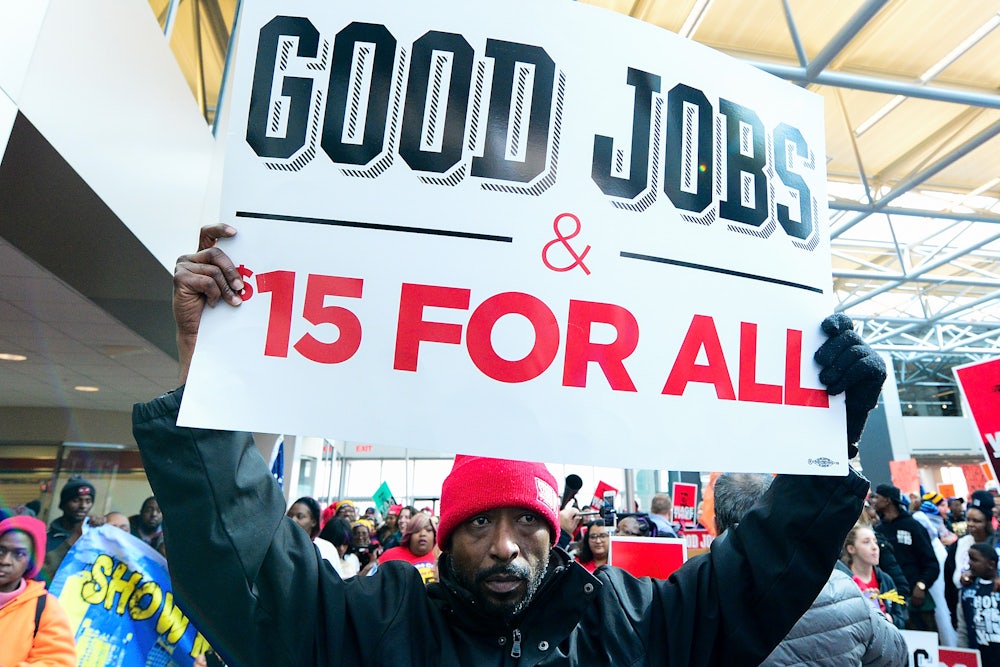None of President Donald Trump’s cabinet nominees garnered more activist opposition than Betsy DeVos, the billionaire Republican donor who was nevertheless confirmed by the Senate as education secretary. Andy Puzder, whom Trump nominated for labor secretary, is also widely loathed on the left, but didn’t generate the same level of intense opposition, and was nevertheless forced to withdraw from consideration.
There is a good lesson to be drawn from these incongruous outcomes, but also a risk that they will be over interpreted.
It’s hard to know which nominee was less fit to be confirmed than the other, as they were both hostile to the departments they were designated to lead and had zero hours of experience working in government between them. In her hearing, DeVos revealed herself to be embarrassingly ignorant of basic concepts underlying debates over education policy and of federal law protecting disabled students from discrimination in their schools. Her conflicts of interests are severe, and she wants to let localities decide whether to allow guns in schools because some might need guns to defend students against grizzly bears.
For his part, Puzder yearned for a future in which workers were replaced by robots. He had similar ethics challenges, though distinguished himself from DeVos by growing his fortune with perv-baiting mass market appeals. But he was ultimately done in this week after Oprah Winfrey provided senators with video of an interview she once conducted with Puzder’s ex-wife, who once claimed he abused her.
What the DeVos and Puzder nomination fights show isn’t that protest and other forms of organized opposition don’t work, but that their effects can be nebulous or nonlinear. The climate in which opposition to DeVos could break through to the broader public contributed to Puzder’s vulnerability, even if it didn’t actually force DeVos out of contention or influence Puzder’s fate in obvious ways.
Politics is weird. Unpredictable things happen all the time. Sometimes, those things confound our ability to tell simple stories about how power works. But that doesn’t mean single-issue protests aren’t working; they are.
We can count the ways in which specific acts of resistance—protests, or calls to congressional offices—have had intended effects. The clearest was most likely the GOP’s swift reversal, prior to inauguration, of their effort to gut the Office of Congressional Ethics. The Department of Health and Human Services likewise partially reversed efforts to depress Affordable Care Act enrollment at the end of January. These acts of mischief, along with several others, were undone because Republicans didn’t expect to attract much negative attention for them, and responded swiftly when they did.
Trump has had better luck getting his cabinet confirmed, despite mass mobilization against several nominees. But that doesn’t mean the mobilization went unnoticed. DeVos spent her first day on the job at the Department of Education doing damage control. (She’s also still being hounded by protesters.)
Vincent Viola, the billionaire trader and executive, withdrew from consideration to be Trump’s army secretary, no doubt in part, because he didn’t want to endure the scrutiny that Trump’s other financially conflicted nominees have faced.
When the White House nixed plans to make investor Anthony Scaramucci director of the public liaison’s office, which manages relations between the administration and the business community, President George W. Bush’s former ethics lawyer told the New York Times that Scaramucci’s entanglements “[do] not seem to me to be a clear disqualifying factor…Another possibility is they decided not to keep him for a political reason and cited an ethics conflict as a cover.”
Rich Lowry, who edits the conservative National Review, admonished Republicans to take the Trump backlash seriously. “In the normal course of things,” he wrote, “it’s not easy even for a well-funded and organized group to get people to spend an evening at a school auditorium hooting at their congressman. If these demonstrations are happening in districts around the country, attention must be paid.”
Republicans are paying some attention, though not typically the right kind. Many of them are hiding from protesters and angry constituents at their town halls. Some are chocking the whole resistance up to paid agitation, but others are clearly allowing the outcry to affect their political thinking. In closed doors with one another, and even to reporters, they bemoan the flack they’re getting for everything, from failing to conduct oversight to taking confirmation votes to pursuing Obamacare repeal.
Democrats have taken more notice still, and have thus waged historic opposition to Trump’s nominees and early agenda items.
Trump himself has paid the closest attention—but the main upshot has been to drive him crazy, which is its own form of reward.
Meanwhile, out of sight, the surge of activism is creating networks that are already helping shake loose latent fundraising potential and political talent, including people willing to run for local office.
Yes, it seems likely that Oprah, not protests by janitors and fast-food workers, ultimately struck the blow that knocked Puzder out. It also seems likely that if the infamous Access Hollywood tape had leaked after, rather than before, FBI Director James Comey reopened the investigation into Hillary Clinton’s email server, then she would be president today. Arbitrary events drive politics perhaps more than they should. But they don’t shape the zeitgeist the way activists can, and today’s zeitgeist can’t be denied.
